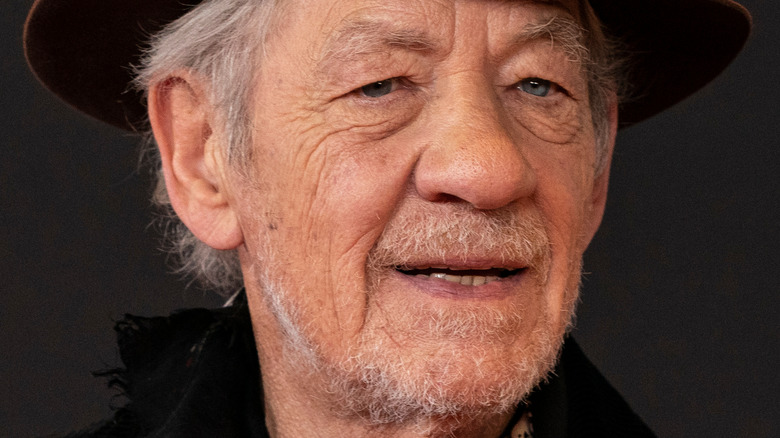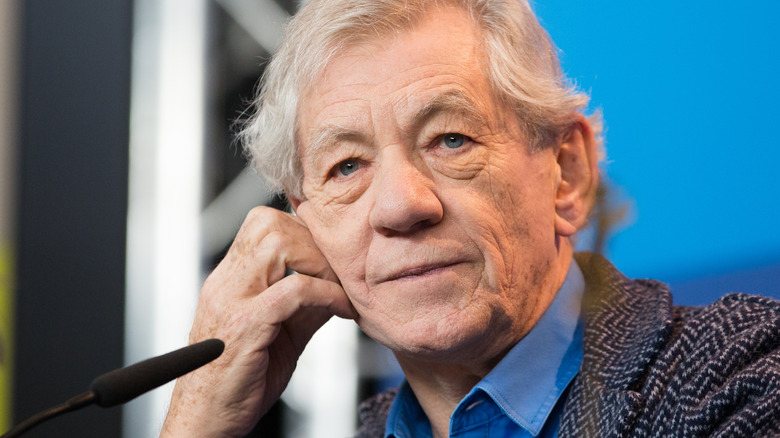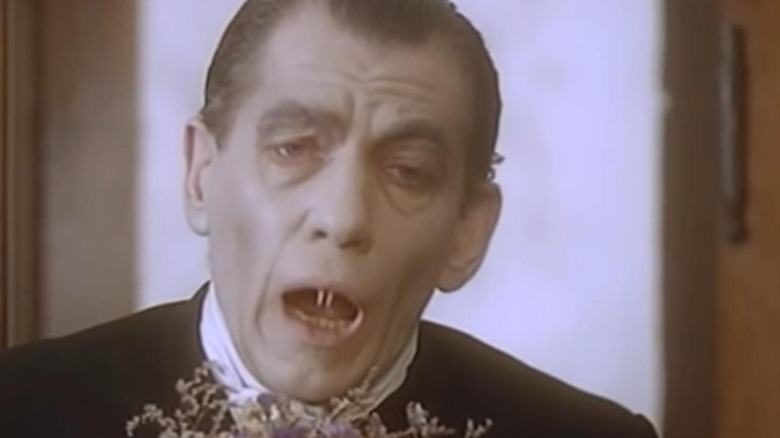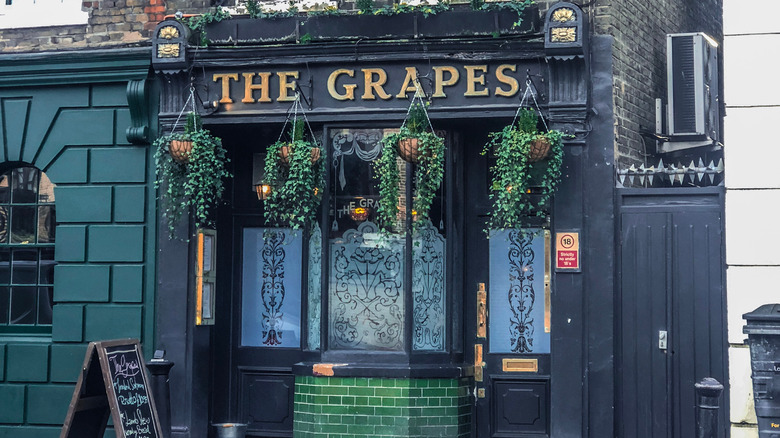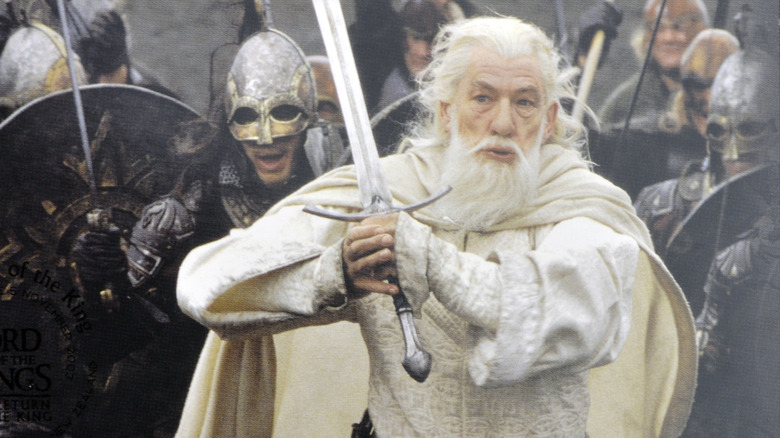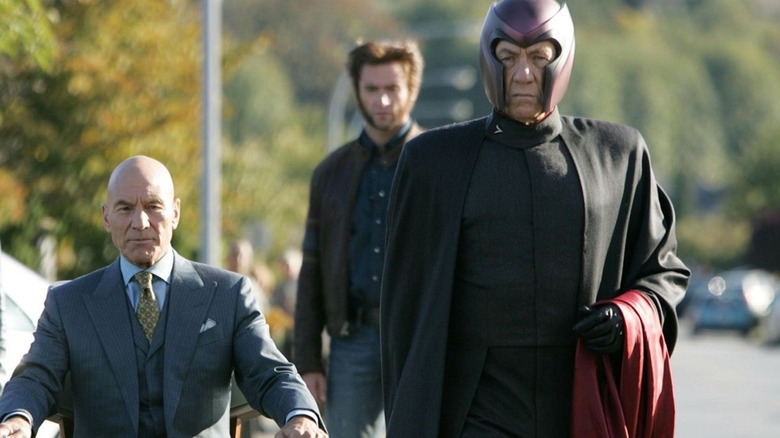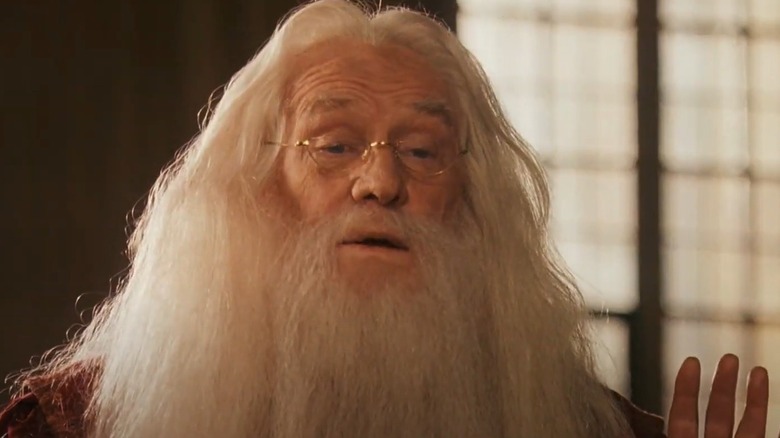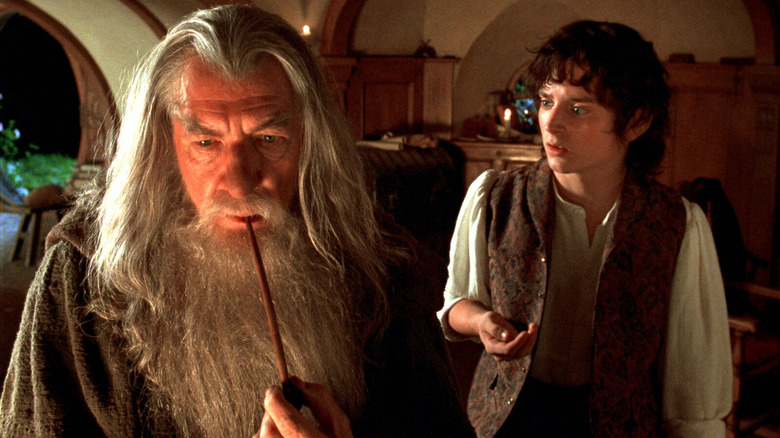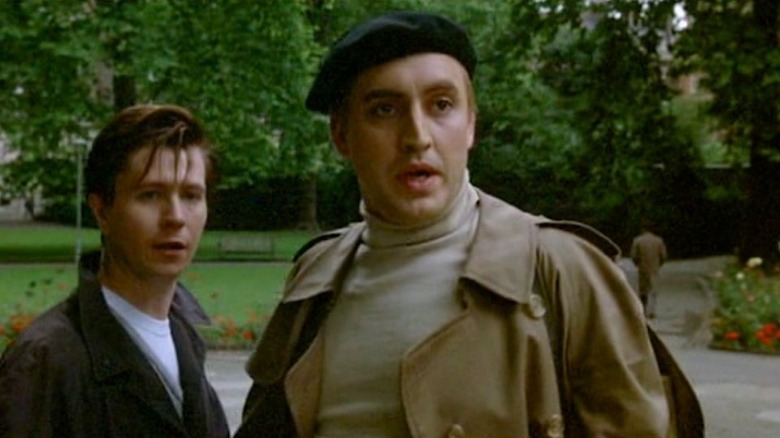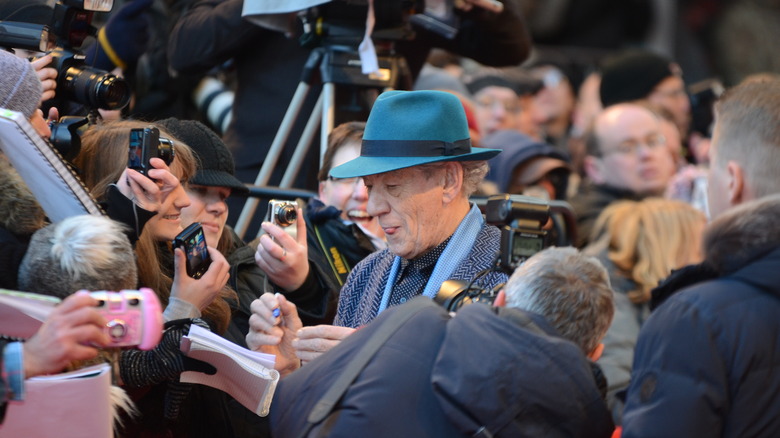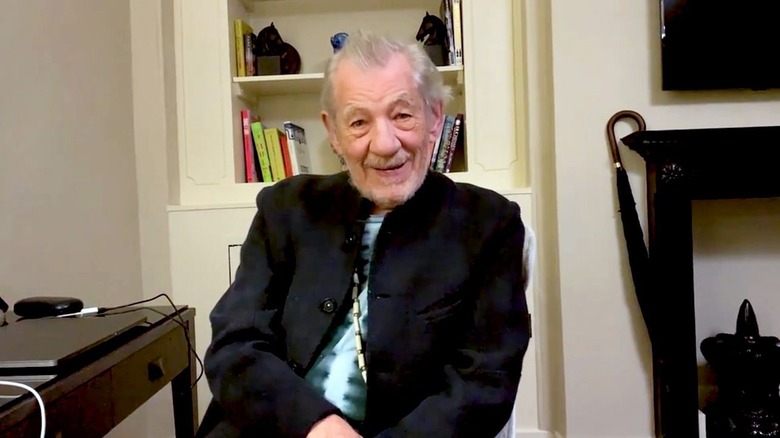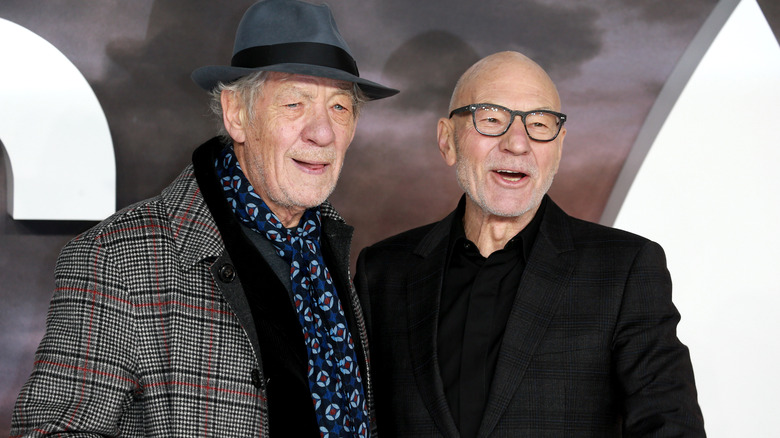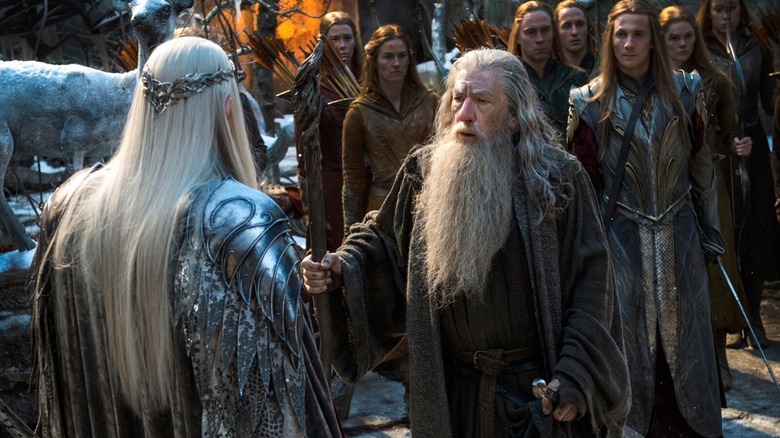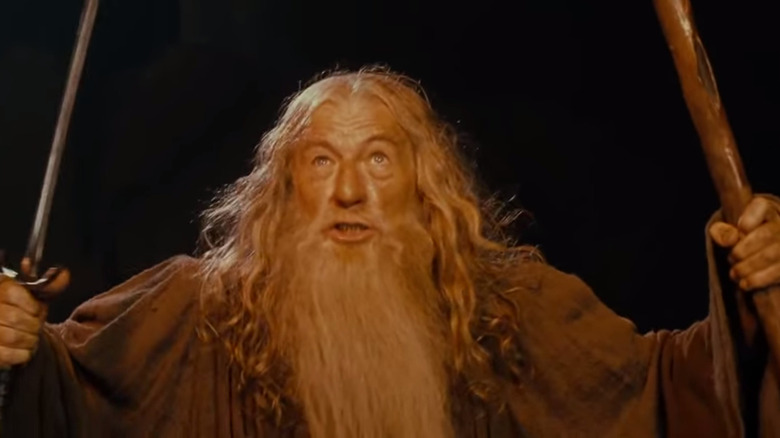The Untold Truth Of Ian McKellen
Sir Ian McKellen has had the kind of acting career that most can only dream about. Having spent decades honing his skills in the U.K.'s top theaters, McKellen eventually made the jump from theater to film with enormous success. Over a professional career that started in 1961 at the Belgrade Theatre, McKellen has portrayed all manners of heroes and villains with a depth that few actors could hope to duplicate.
Out of all the movies he's been a part of, McKellen is best known for his role as the wizard Gandalf from Peter Jackson's "Lord of the Rings" trilogy and Magneto from Fox's "X-Men" movies, with both roles displaying his sense of authority and his sense of humor. Apart from his work in film, theater, and television, McKellen is a very active philanthropist who's devoted his whole life to speaking up for the marginalized. Now in his 80s, McKellen doesn't appear in as many projects as before, but the break from acting is completely well-earned. But today, let's take a look at some of the lesser-known parts of Ian McKellen's rise to stardom.
Ian McKellen was a child of war
Magneto — as played by Ian McKellen — grew up during World War II, with the first film opening in 1944. Needless to say, this had a major impact in shaping Magneto's worldview. And this is actually a trait the character shares with McKellen, as the actor was born right before the war kicked off. Speaking about the effects of the wartime efforts on his young mind, McKellen once wrote (via McKellen.com), "Only after peace resumed (Union Jacks in the streets on VJ Day) did I realize that war wasn't normal."
While the times were difficult for McKellen and his family, they weren't only about doom and gloom. The actor has described himself as a happy child who took pleasure in the small things, such as the Saturday market in his English hometown of Wigan. Here, McKellen first caught a glimpse of his future passion in an unexpected place.
"They were the first performers I saw working close to," the actor once recalled, referring to traders at his local market who dressed as characters from Greek mythology. "Few had much glamour (the one selling hair-restorer wore a wig), but they had an energy, a confidence, and an optimism that lifted them beyond the shoddy they traded in. They made me want to become an actor."
He once played a vampire in a music video
Despite his status as an iconic actor, Ian McKellen has always been willing to go against his established image in unusual ways. One of the best examples of this can be found in "Heart," a song by English synth-pop duo Pet Shop Boys from their 1987 album "Actually." Here, we find McKellen playing the role of a vampire, one inspired by the classic horror movie "Nosferatu."
In the music video, McKellen portrays a scheming vampire who wishes to seduce a new bride from her husband. Once the couple arrives at the vampire's castle, McKellen sets about his plan, using his powers to draw the woman away from her lover. In the end, McKellen takes the bride for himself, and the two are chauffeured off as the former groom watches in baffled anger.
However, his turn as a charming bloodsucker wouldn't be the last time McKellen appeared in a music video. He was also featured in the song "Listen to the Man" by George Ezra, released in 2014.
The inspiration for playing Gandalf
Ian McKellen's take on Gandalf is one of the most iconic actor-character pairings in cinema history. Apart from his natural charisma and gravitas, what makes McKellen's Gandalf so memorable is his rich and layered voice. Hearing McKellen talk as Gandalf, you find it easy to believe that the character is an ancient wizard with unfathomable knowledge and power, tinged with a certain world-weariness.
To bring that level of wisdom and experience to the role, McKellen found inspiration in none other than the author of the "Lord of the Rings" novels, J.R.R. Tolkien himself. "We listened to audio recordings of Tolkien reading excerpts from 'Lord of the Rings,'" director Peter Jackson explained in an interview with The Huffington Post. "We watched some BBC interviews with him — there's a few interviews with Tolkien — and Ian based his performance on an impersonation of Tolkien."
Tolkien's narration proved an ideal starting place for McKellen to find his way into Gandalf. "He's literally basing Gandalf on Tolkien," Jackson explained. "He sounds the same, he uses the speech patterns, and his mannerisms are born out of the same roughness from the footage of Tolkien."
He often acts as a quizmaster
One of the most arresting aspects of Ian McKellen's legendary screen presence is his deep and perfectly modulated voice. The actor developed it to such perfection over several decades of acting on stage, where performers need to make sure their dialogue can be heard clearly all the way in the back of the theater.
Apart from lending his voice to many iconic characters, McKellen isn't above using his skill in the role of quizmaster. The actor is part owner of a pub in London called The Grapes. Far from being an absentee investor, McKellen is very active in the day-to-day working of his pub. This includes holding quizzes for the customers where McKellen acts as the master of ceremonies.
One has to assume the quizzes are plentifully supplied with trivia regarding Gandalf, Magneto, and the plethora of notable characters that McKellen has played over the years. But the actor isn't above dipping into other subjects in his capacity as a quiz master, like the time he held an impromptu "Friends" trivia round on "The Graham Norton Show."
He's a fan of Gandalf the White
One of the most memorable comebacks in all of fiction happens when Gandalf the Grey is killed in his encounter with the Balrog and returns from the dead in the form of Gandalf the White. This new version of Gandalf is wiser and more powerful, but that doesn't necessarily mean he's more interesting to portray. In fact, quite the contrary, according to Ian McKellen.
In an interview with Gizmodo, the actor opined that playing Gandalf the Grey was simply more fun, admitting, "[Gandalf] the White was not [mine and Peter Jackson's] favorite." The conversation took place before the release of "The Hobbit" movies, where McKellen reprised his role as Gandalf the Grey.
"We stuck with him through two movies," explained McKellen about the white version of Gandalf, "but we're very glad to get back to the long-bearded, straggle-bearded Gandalf the Grey. Who sleeps under hedge rows, who likes drinking down in Hobbiton and having a smoke, and telling a joke and having some fun."
Why Ian McKellen wanted to play Magneto
If there's one role that comes close to the popularity of Ian McKellen's Gandalf, it's the actor's take on the supervillain Erik M. Lehnsherr, aka Magneto. In a lot of ways, Magneto is Gandalf's opposite, being completely ruthless and obsessed with dominating mankind. McKellen portrays Erik with the same relish that he shows towards Gandalf, and his reason for accepting the role is fascinating.
In the documentary "McKellen: Playing the Part" (via Ars Technica), the veteran actor revealed that he was willing to take a chance on playing Magneto despite the character's comic book origin rather than because of it. "[The X-Men stories] mean something, and that's what separates 'X-Men' from the other comics," McKellen said about his decision to become Magneto.
According to the actor, Magneto's desire to establish a new world order, fueled by the horrors he'd witnessed as a child in a Nazi concentration camp, made him much more complex and compelling than the typical action movie character. "Superman, the Hulk, Spider-Man, even James Bond, they're all the same people," McKellen said. "Wimps who change out of clothes and become superheroes, discovering their inner light. That's not Magneto. He's political, a warrior, clearsighted, pained, anguished, determined. That's a part really worth playing."
Turning down Dumbledore
When it comes to famous wizards, you've got Merlin, Gandalf, and the new kid on the block: Albus Dumbledore. The headmaster of Hogwarts School of Witchcraft and Wizardry shares more than a few similarities with Gandalf, given their immense power, fondness for long beards and robes, and a habit of entrusting world-saving missions to highly inexperienced and constantly bewildered main characters.
Naturally, given his Oscar-nominated performance as Gandalf, it makes sense that Ian McKellen was once in the running to play Dumbledore. On BBC's "HARDtalk," McKellen claimed that after original Dumbledore actor, Richard Harris, passed away, the "Harry Potter" producers called him up and offered him a part. While they didn't specify what role they were offering him, the actor deduced it was the Hogwarts headmaster. However, McKellen turned down the role.
Why? Well, McKellen passed on the part because he knew Harris hadn't approved of him as a performer, with the late actor once saying of McKellen, Derek Jacobi, and Kenneth Branagh, "These guys — technically brilliant, but passionless." McKellen was aware of Harris' criticisms of his acting technique, and as he explained, "I couldn't take over the part from an actor who I'd known didn't approve of me."
Gandalf doesn't do weddings
Gandalf the Grey is known to be a man of reasonably good humor. And Ian McKellen's wizard was always ready to smoke a pipe with his companions and share a laugh or two. But don't let this easy-going demeanor fool you. McKellen has rather strict views about what kind of actions befit Gandalf's dignity, and officiating weddings was apparently not on the list.
According to a report by Vanity Fair, Ian McKellen was made an offer he couldn't refuse by billionaire businessman Sean Parker. "I was offered $1.5 million to marry a very famous couple in California," McKellen revealed about the arrangement. This wasn't a highly unusual request since McKellen has officiated weddings before, most notably his friend and frequent co-star Patrick Stewart's marriage to jazz singer Sunny Ozell.
However, there was one aspect of officiating Parker's wedding that gave McKellen pause. "I would perhaps have considered doing [Parker's wedding], but I had to go dressed as Gandalf," the actor explained. "So I said, 'I am sorry, Gandalf doesn't do weddings.'"
The role he regrets turning down
With a career as long and diverse as Ian McKellen's, you might think the actor has exhausted every possibility for self-expression the medium would allow. But like any other actor, no matter how successful, there are roles that passed McKellen by — much to his regret. One such part was the role of Kenneth Halliwell in 1987's "Prick Up Your Ears."
The movie is considered one of the most important British films of its decade. It tells the story of celebrated playwright Joe Orton (Gary Oldman) and his complex history with his mentor, lover, and finally rival Kenneth Halliwell. After McKellen passed on the part, the role eventually went to Alfred Molina. The film garnered critical acclaim, and the lead performances from Oldman and Molina came in for special praise, with Roger Ebert declaring them "two of the best performances of the year."
For his part, McKellen admitted that his reason for turning down Halliwell's role was more a matter of personal exhaustion than professional disinterest. "I needed a holiday," he explained to Larry King. "I'd been working so hard, so I just kept saying, 'No, no, no,' but when I saw the film, I really regretted not having done it."
Ian McKellen passed on a massive book deal
A life as rich and varied as Ian McKellen's has attracted the curiosity of fans for a long time, so naturally, the publishing world wanted to get in on the action. To that end, they reportedly offered McKellen $1.4 million to write an autobiography. At first, the actor accepted the deal, but later, he found himself unable to go through with the task.
"I put nine months aside to do it, and I got a very handsome advance," McKellen remarked during 2016's Oxford Literary Festival (via The Hollywood Reporter). "Then I sent the money back. It was a bit painful." He went on to explain that the sadder memories of his life weren't something he wished to dwell on, even for the sake of a hefty publishing deal.
"I didn't want to go back into my life and imagine things that I hadn't understood so far," McKellen continued to explain regarding turning down the deal. "The privacy of my life I don't quite understand myself, and it has nothing to do with what I do for a living. So there you go, I'm sorry."
He was one of the first celebs to start a blog
While fans were disappointed to find out that Ian McKellen had turned down the deal to publish his autobiography, the actor has actually been sharing his private thoughts and experiences with the world for the past two decades via the internet. During the filming of the "Lord of the Rings" saga, McKellen became one of the early celeb adopters of the world wide web when he began to publish his personal journal in the form of regular blog posts.
The actor's personal website, which is still active to this day, offers a valuable insight into his thought processes and what goes into creating McKellen's most memorable roles. For instance, he mentions that his decision to play Gandalf wasn't just a result of his interest in the character but in the entire filming process. "I invariably look at the job as a whole," McKellen wrote. "Who will direct, who will be cast, how long will it take, do I want to work in Leeds (or Toronto or ... Wellington). So with 'The Lord of the Rings,' the whole venture across three movies and across the magical landscape of New Zealand, is as invigorating as the opportunity to embody a legend."
At other points in his blog entries, we get to read about how intimidating it was for McKellen to act opposite Christopher Lee as Saruman and how delighted he was to hear that Cate Blanchett had been added to the cast in the role of Galadriel.
He once gave Patrick Stewart some pretty terrible advice
On the screen, Ian McKellen and Patrick Stewart are famous for playing frenemies Magneto and Charles Xavier, respectively. In reality, the two have been friends ever since their young days doing theater together in the U.K. Still, there was a time when McKellen mirrored Magneto's behavior by giving Stewart some pretty terrible advice, even if he did so from a genuine place of caring.
Back in the late 1980s, Stewart and McKellen had made great names for themselves as well-reputed classical actors with the Royal Shakespeare and National Theatre companies. That was when Stewart was approached to play the lead role of Captain Jean-Luc Picard in "Star Trek: The Next Generation." In an interview with BBC, McKellen freely admitted that he thought making the jump to U.S. television would be a step down for Stewart.
"I am the man, the only person, who advised him not to take a seven-year contract with 'Star Trek,'" McKellen explained, while also being quick to admit he'd been completely wrong in his assumption that playing Picard would damage Stewart's career. "I think he has forgiven me. Well, he's proved that I was an idiot!"
The one job that broke him
Over a career spanning several decades, you'd think Ian McKellen has seen it all when it comes to acting. Yet, on the sets of "The Hobbit," McKellen faced a challenge unlike any other — one that reduced him to tears in front of the cast and crew and almost forced him to quit the project.
The issue was that Peter Jackson relied a great deal on CGI for making "The Hobbit." This meant that McKellen had to act in a highly unnatural manner, without any co-stars, standing in front of a green screen. As McKellen revealed in his documentary (via Ars Technica), the breaking point was when he found himself trying to act opposite photographs of his co-stars. "Where should I look? Well, they put photos of each of the actors on a stand, and whoever was talking, their light flashed."
This method of performance was the last straw for McKellen's patience, and he ended up inadvertently denouncing the whole thing in front of the crew. "At the end of the day, my mouth was very close to the mic hidden in my forest of a beard, and I said to myself, 'This is not why I became an actor.' I was quite tearful ... but this was accidentally broadcast across the studio."
Ian McKellen's most iconic line is wrong
Despite enthralling thousands of theater enthusiasts every night with his command over Shakespearean monologues, the one line that Ian McKellen is most commonly associated with comes from "The Fellowship of the Ring," when Gandalf faces off against the demonic Balrog — "You shall not pass!" Turns out that line is as wrong as it is iconic.
During an interview with Graham Norton, McKellen revealed that Gandalf's actual line in J.R.R. Tolkien's book was, "You cannot pass." Gandalf does say that line at first when he comes face to face with the Balrog, but for the final shout when Gandalf breaks the bridge they're standing on, "cannot" changes to "shall not." McKellen still regrets making the mistake, confessing, "I got it wrong, and I'm rather stuck with it now."
While being technically wrong, Gandalf's utterance has since become one of the most iconic lines in cinema. And the actor is quite obliging when fans want him to utter the words, like the time he warned school students about what would happen if they failed to study properly for their exams.
